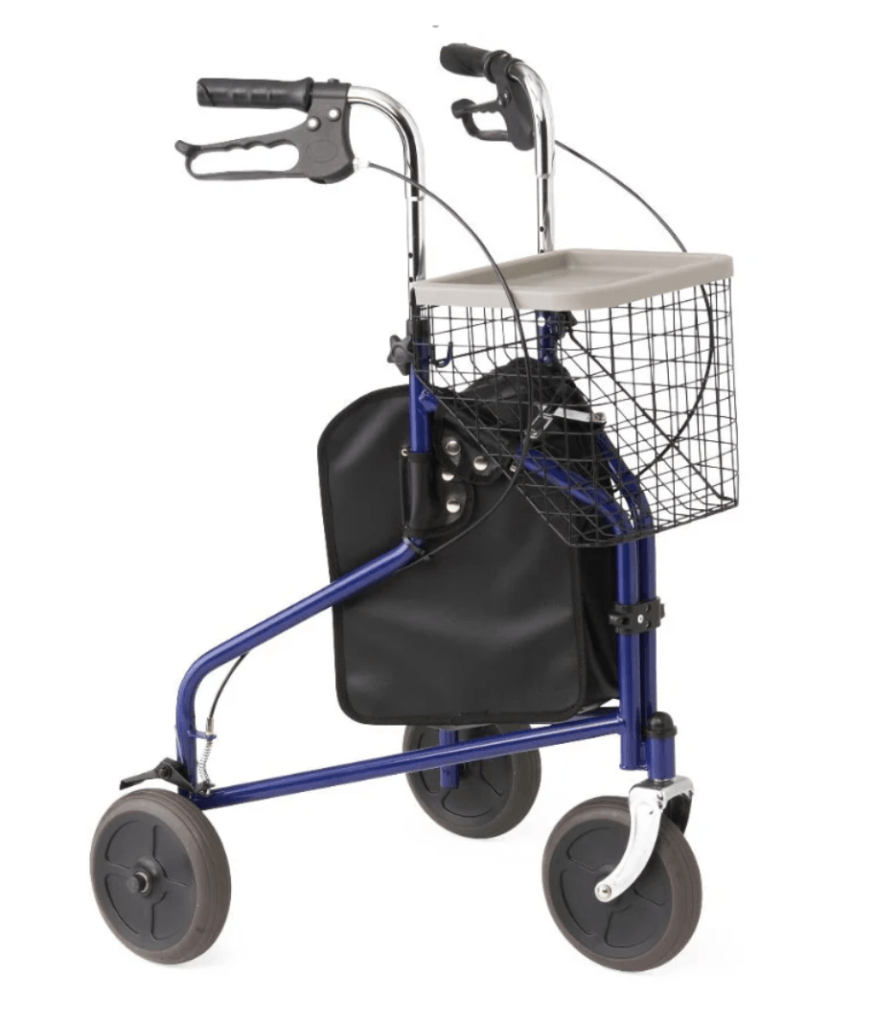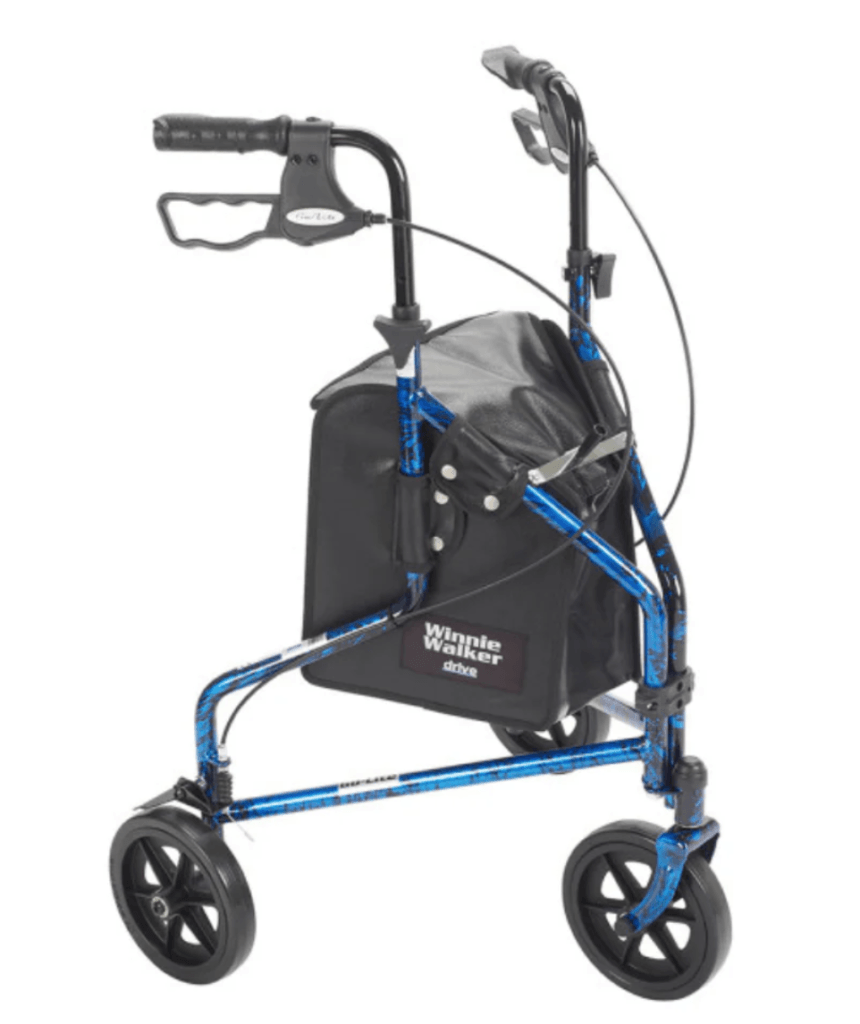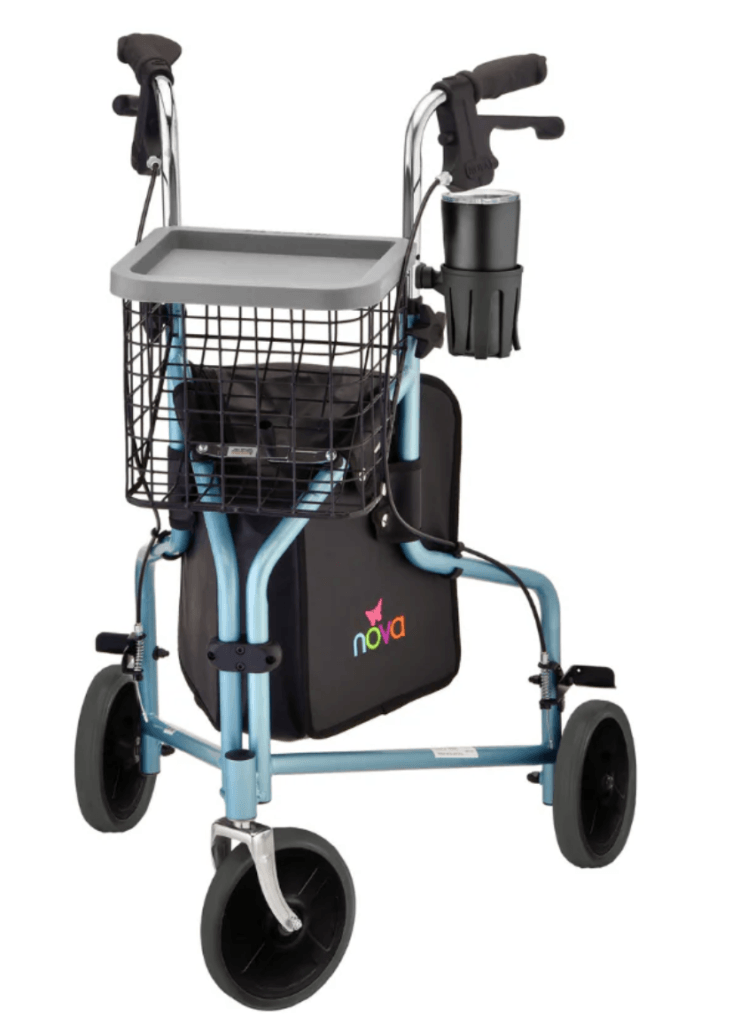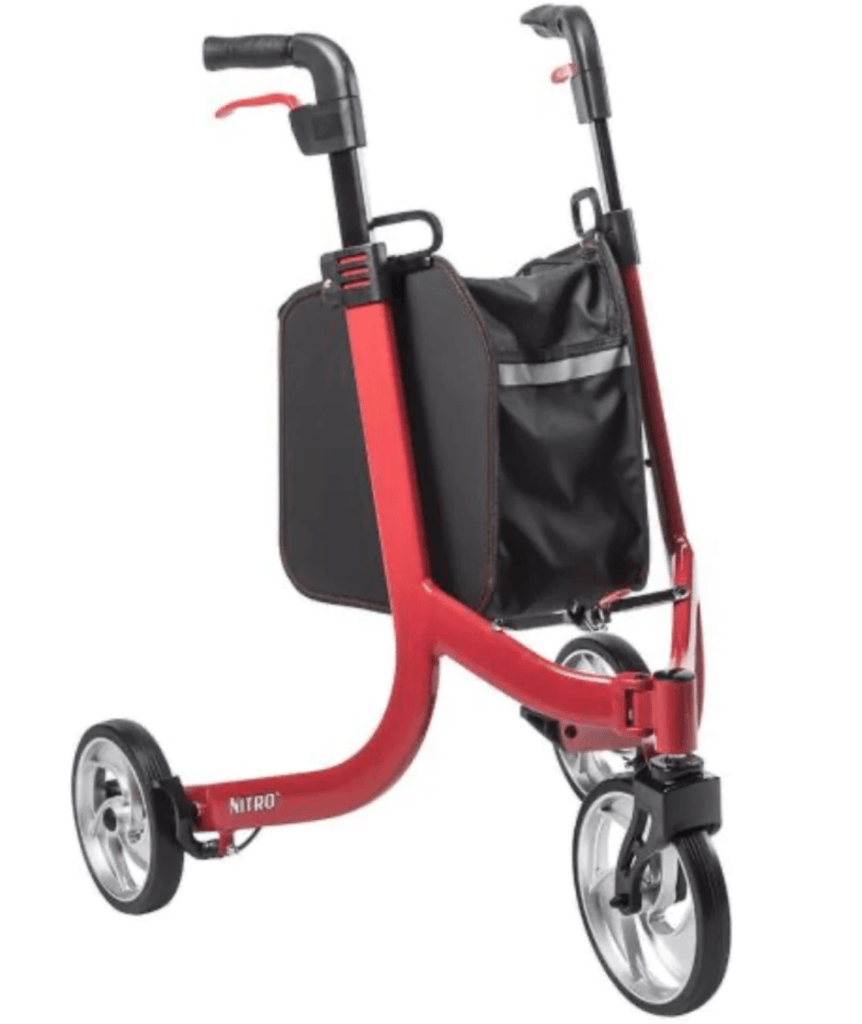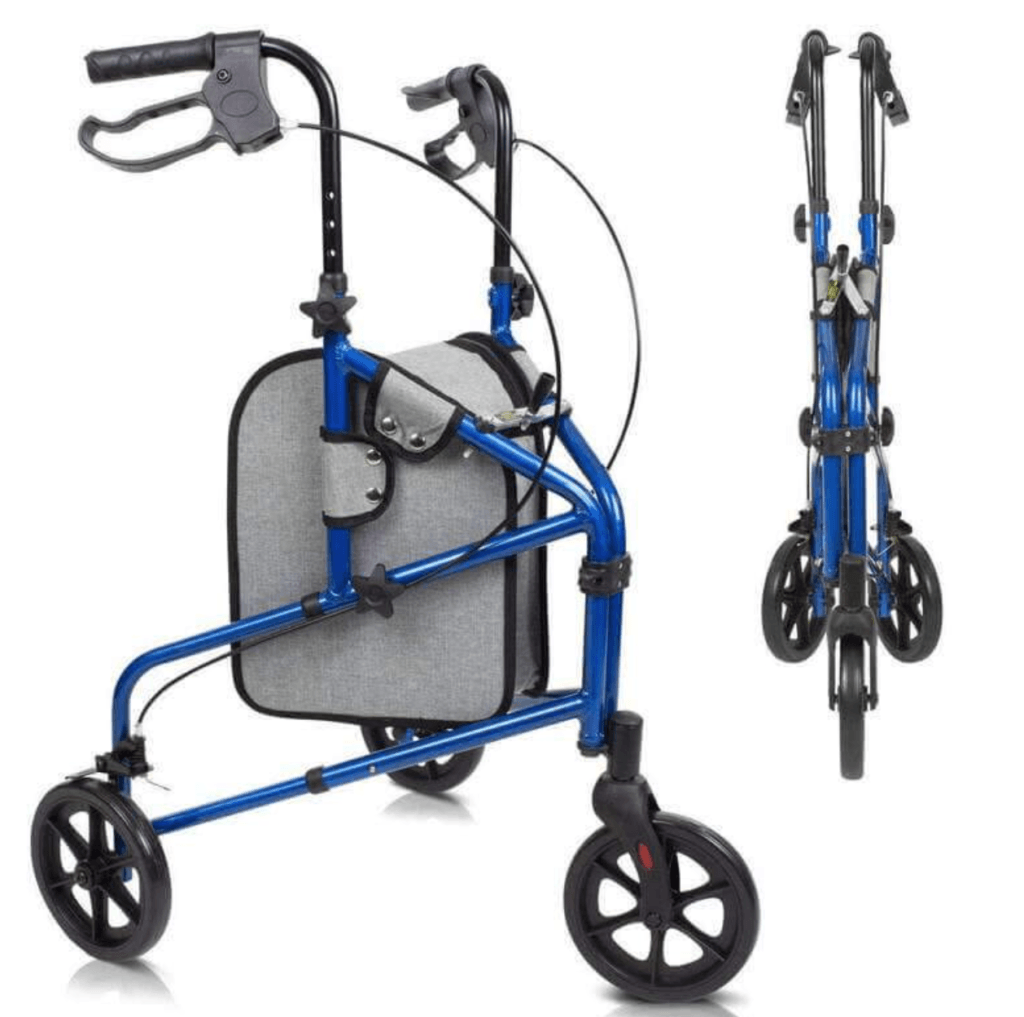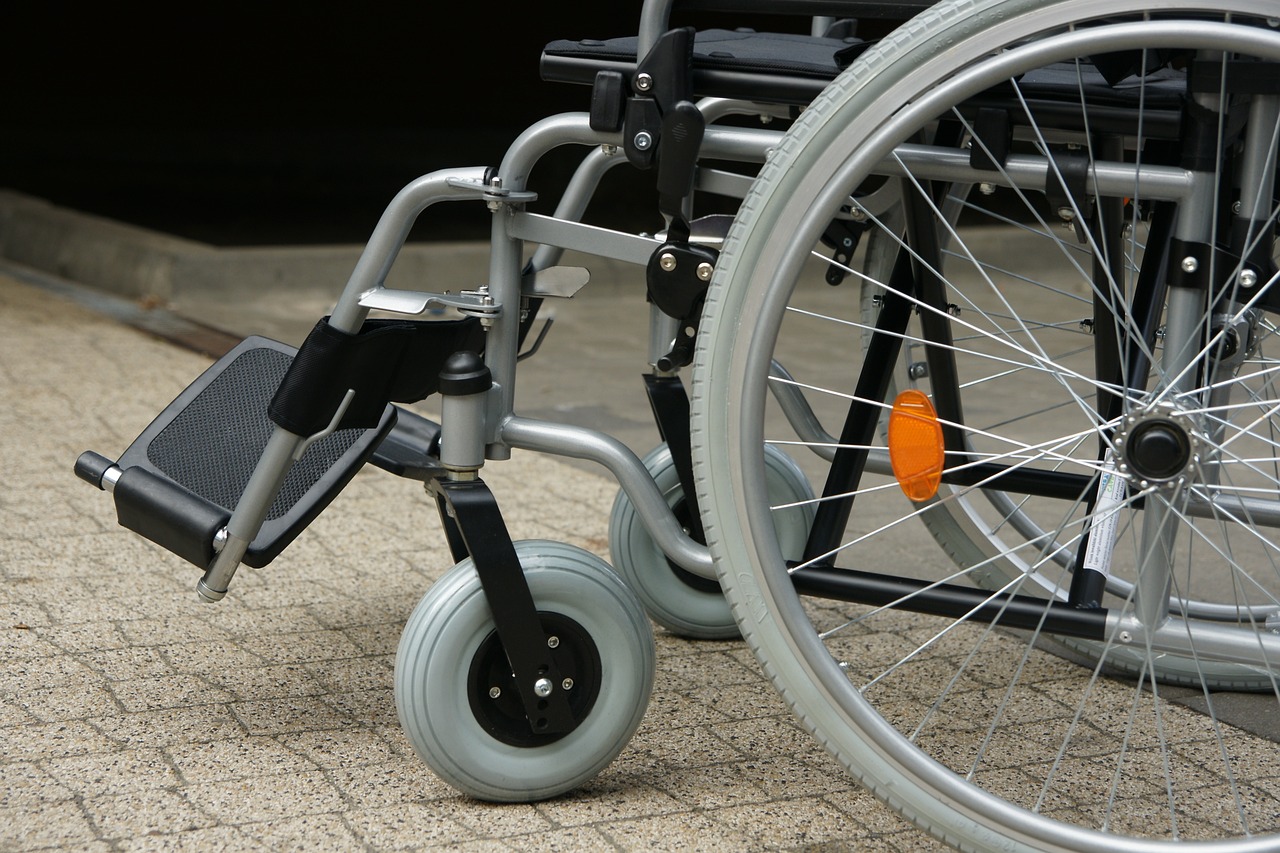With their lightweight design, maneuverability, and user-friendly features, 3-wheel walkers (aka rollators) are ideal for those who need a little extra support while staying active.
Whether it’s navigating crowded indoor spaces, strolling through the park, or running errands, a reliable 3-wheel walker can provide the balance and confidence needed to maintain an active lifestyle.
And for seniors who find traditional walkers or rollators limiting, these 3-wheel walkers can offer a nice balance between stability and ease of movement.
In this guide, we’ll review the best 3-wheel walkers currently available, but we’ll also go over all the key specs and features seniors and caregivers should look for before purchasing.
After reading, you’ll be ready to find the right rollator for yourself or loved one.
| Handle Adjustment | Weight Limit | Weight | Warranty | |
| 1. Drive Medical 3-Wheel Rollator | Up to 6’2″ | 300 lb | 11 lb | Lifetime frame |
| 2. Nova Medical Traveler | 5’4″ – 6’2″ | 250 lb | 16.5 lb | Lifetime frame 5 year brakes |
| 3. Drive Medical Nitro | Up to 6’2″ | 300 lb | 13 lb | Lifetime frame |
| 4. Vive Health Lightweight Rollator | Up to 6’2″ | 250 lb | 11 lb | Lifetime frame |
| 5. Planetwalk 3-Wheel Rollator | Up to 5’8″ | 260 lb | 11 lb | ? |
Why Choose a 3-Wheel Walker?
Three wheel walkers are designed with 2 wheels in the rear and a single wheel in the front, giving them a triangular shape.
This instantly makes them smaller, lighter, and easier to manage than walkers and rollators with 4 wheels.
Losing a wheel takes a little away from the walker’s stability, but it does offer a few advantages:
- Compact Design: The triangular structure makes them more lightweight and easier to maneuver in tight spaces.
- Portability: Most models are foldable and lighter, making them easier to transport.
- Enhanced Maneuverability: The single front wheel allows for sharper turns, perfect for navigating crowded areas or tight corners.
- Versatile Features: Often equipped with storage bags, trays, or baskets for added convenience.
- Stylish Options: Available in various colors and designs to suit personal preferences.
Three wheel walkers are great, but that doesn’t mean they’re appropriate for everyone…
Who Should Consider a 3-Wheel Walker?
A 3-wheel rollator may not be the best choice for everyone, but it’s an ideal solution for certain individuals.
Consider opting for a 3-wheel walker if you:
- Have Good Balance: While 3-wheel walkers offer support, they are less stable than their 4-wheel counterparts. Seniors with relatively good balance who need moderate support may find them beneficial.
- Need Enhanced Maneuverability: If you frequently navigate tight spaces, crowded environments, or sharp corners, a 3-wheel walker’s compact and agile design can be advantageous.
- Require Lightweight Mobility: These walkers are easier to lift, fold, and transport, making them a great option for seniors who travel frequently or need portability.
- Primarily Use Indoor Surfaces: While some models are designed for light outdoor use, 3-wheel walkers perform best on smooth, indoor surfaces.
- Don’t Need a Seat: If you don’t require a built-in seat for resting, the minimalist design of a 3-wheel walker can be more practical.
So, 3-wheel walkers are best suited for seniors who have decent balance and are looking for a smaller, lighter walker that’s easier to manage.
However, those who need maximum stability, have severe mobility limitations, or frequently traverse uneven terrains might benefit more from a 4-wheel rollator (or other kind of walker).
When in doubt, always consult with a healthcare provider or physical therapist to determine the most suitable option for your needs.
The 5 Best 3-Wheel Walkers/Rollators for Seniors
1. Drive Medical 3-Wheel Walker Rollator
Pros
- Affordable
- Lightweight
- 8″ wheels
- Basket, tray, and pouch included
- Fits users up to 6’2″
Cons
- Not the sleekest looking walker
Drive Medical is one of the most trusted names in home medical equipment and I’ve been recommending their walkers, bedside commodes, and shower seats to patients for years.
I like Drive because their products are affordable and work the way they’re suppose to.
And their take on the 3-wheel rollator is no different.
Drive’s 3-wheel rollator is pretty simple and there aren’t any big surprises when it comes to features, but it’s well-priced and should do the trick for seniors looking for a basic model.
And at only 11 lb, it’s one of the lightest rollators out there (it also folds in half for easy transport).
This walker comes with 8″ wheels, which is pretty standard, allowing it to handle sidewalks and paved surfaces pretty well when outside.
It’s handles can be easily adjusted anywhere from 31″ – 38″, which should allow it to fit users upwards of 6’1″ – 6’2″ (I’m 6’1″ and would use the handles at around 37″).
This walker also comes standard with a removable basket, a storage tray, and a little storage pouch that allows you to hold small items while walking.
Oh, and Drive Medical offers a limited lifetime warranty on the frame too, which is nice.
The only real downside I see here is that this isn’t the sleekest looking walker – it does look a bit dated.
But otherwise, this is the perfect example of a classic 3-wheel rollator. Seniors looking for an affordable option should certainly consider it.
2. Nova Medical Traveler
Pros
- Thick, 8″ wheels
- Fits users up to 6’2″
- Basket, tray, and pouch included
- Sleek frame
- Great warranty
Cons
- Little heavier
- Little more expensive
If you’re looking for a more attractive looking walker, Nova Medical’s Traveler might be more your speed.
Not only does this rollator come with a sleeker design, but it also comes in 5 different colors, giving you plenty of style options.
More importantly though, the Traveler is a great walker with some top-notch features.
Like Drive’s model above, the Traveler comes with 8″ wheels, but you’ll notice that the wheels on this walker are much thicker.
This added width helps make them a bit more stable when going over rougher, more uneven terrain – which could come in handy for seniors who may find themselves walking outside more often.
The handles are easily adjusted, allowing the Traveler to fit most folks between 5’4″ – 6’2″ tall.
And this walker also comes with an included basket, tray, and pouch for storage (and it’s compatible with several additional accessories, sold separately).
There’s not much to complain about with this rollator, but at 16.5 lb, it’s a little heavier than some competitors.
It’s also a little more expensive than some, but considering it comes with a lifetime frame and 5 year parts warranty, the added cost may be warranted.
It also folds in half for easy storage/transportation though and it’ll even stand up on its own when folded.
Overall, seniors looking for a sleek, durable 3-wheel rollator should consider Nova’s Traveler.
3. Drive Medical Nitro
Pros
- Hidden cables
- Push button handle adjustments
- 9″ front wheel
- Removable storage pouch
- Sleek design
- Lifetime frame warranty
Cons
- A little pricey
The Nitro is Drive Medical’s luxury 3-wheel rollator and at first glance, it definitely looks sleeker than a lot of the other models out there.
This is largely due to the fact that we don’t see any cables sticking out front – instead, they’ve been hidden inside the frame.
This makes for a better looking walker, but it also eliminates the chances of the cables getting stuck on furniture or other obstacles (which does happen by the way).
You might also notice that the front wheel is a bit larger than the rear wheels.
Specifically, the Nitro comes with a 9″ front wheel and standard, 8″ wheels in the back.
Having the larger front wheel can help with navigating over uneven ground and may even help provide a smoother turning experience.
This is all great, but I really like the fact that you can adjust the height of the handles with the simple touch of a button.
Unlike most 3-wheel rollators, you don’t have to unscrew anything to adjust the handles.
The Nitro also folds in half for easy storage and only weighs about 13 lb, making it quite manageable for most users.
Oh, this walker also comes out of the box fully assembled, so you don’t have to worry about putting it together.
The Nitro doesn’t come with a basket or tray, but it does come with a spacious, removable pouch for storage.
Now the only real downside to the Nitro is the cost – at over $200, it’s pricey for a 3-wheel walker.
But you know what they say about getting what you pay for.
If you’re looking for a luxury experience, Drive’s Nitro is likely worth the cost (that said, Amazon usually sells it for a bit cheaper than other retailers).
4. Vive Health Lightweight 3 Wheel Rollator
Pros
- Lightweight frame
- Affordable
- Storage bag included
- Fits users up to 6’2″
- Lifetime frame warranty
Cons
- 250 lb weight limit
Vive’s 3-wheel rollator is another good example of a classic model that’s well-priced.
Like the Drive walker mentioned earlier, this walker doesn’t really come with any big surprises, but it’s affordable, easy to assemble, and remarkably lightweight.
And by lightweight, we’re talking 11 lb fully assembled.
This, combined with the easy folding mechanism, makes the Vive walker one of the easiest rollators to transport.
Like most rollators, this model comes with 8″ wheels all around, as well as adjustable handles that reach up to 38″ high (should fit most users up to 6’2″).
And this walker doesn’t come with a tray or basket, but it does include a large transport bag that can be used to haul lightweight objects.
Vive also provides a lifetime frame warranty, which is always nice to see.
The only real downside I see here is that since this is such a small, lightweight rollator, it’s going to be better suited for smaller users.
It actually only has a weight limit of 250 lb, which is a bit lighter than the 300 lb limit seen on some other models.
But for smaller seniors looking for a lightweight, affordable rollator, it could be a great option.
5. Plantetwalk Premium 3-Wheel Rollator
Pros
- Sleek design
- Lightweight frame
- Easy to adjust handles
- Storage bag included
- Great price
Cons
- Only fits users up to 5’8″
- No warranty
Rounding out my list is an affordable rollator that’s been getting high praises from users – that’s actually a bit of an understatement, this walker has become one of the most popular rolling walkers on Amazon.
And that’s no easy feat.
I like the name too.
Regardless, Planetwalk’s 3-Wheel Rollator is a sleek little walker with some great features.
For starters, I really like the thicker aluminum tubing used for the frame and the push button adjustments used for the handles.
That said, this walker only comes with 5 height adjustments for the handles and the highest setting is designed to fit users at around 5’8″.
So, this walker is definitely designed for smaller users.
But at only 11 lb, this folding walker is really easy to store and travel with, which could be a big perk for seniors who plan on keeping this walker in their cars.
Let’s see, this rollator comes with standard, 8″ wheels and an included storage bag, so no big surprises there.
The biggest downside I see for this walker, except being designed for smaller folks, is that there’s no description of any warranty what so ever.
Like many cheaper brands on Amazon, this likely means there really is no warranty.
But smaller seniors looking for an attractive 3-wheel walker that won’t break the bank may still want to consider it.
What to Look For in a 3-Wheel Walker
When choosing a 3-wheel walker, there are a few key specs and features you should look for to ensure you get something you’ll be happy with.
These include:
Adjustable Handles
The first thing you should probably look for before purchasing one of these walkers is the height range for the handles.
Most of these walkers are designed to fit folks who are between 5′ – 6′ tall, so if you fall within this range, you’re probably ok.
But there’s no reason to take any chances.
Some brands will give you a height range, others will simply tell you how high off the ground the handles will go at the shortest and tallest positions.
Most 3-wheel rollators max out at a handle height of around 38″, which should fit most seniors up to around 6’2″.
But other walkers come with shorter height ranges.
Before buying, make sure you have a rollator that will accommodate your height.
Weight
Three wheel rollators are quite a bit lighter than standard rollators, but they can still vary in size and weight.
This makes it a good idea to look for the assembled weight before making any purchases, especially if you’re worried about being able to transport your new walker.
For the sake of reference, most 3-wheel rollators weigh somewhere in the 11 – 20 lb range.
Wheel Size
Having larger wheels is advantageous, especially when it comes to walking outside over more uneven surfaces.
Fortunately, most of these walkers come with 8″ wheels, which do a pretty good job outside.
But double check the wheel size before making a purchase to make sure they’re big enough to go where you want to go.
Some walkers may even come with larger wheels for better stability and handling.
Weight Capacity
Even though 3-wheel walkers usually don’t offer a seat, it’s still a good idea to check the weight capacity before making a decision.
And even though you shouldn’t be putting much weight down through the handles, it’s a good idea to abide by the manufacturer’s weight limits.
Most of these walkers come with weight capacities in the 250 – 300 lb range.
Warranty
I suggest folks check warranties for anything they buy, so 3-wheel rollators are no exception.
Seeing a generous warranty is always a good sign of superior build-quality and all other things even, I’d go with the walker with the better warranty.
Nicer walkers will offer lifetime frame guarantees and a few years on brakes/components.
Cheaper options may not offer a warranty at all.
4-Wheel vs 3-Wheel Rollators
When deciding between a 3-wheel or 4-wheel rollator, understanding their differences can help you choose the right option for your needs:
| Feature | 3-Wheel Rollator | 4-Wheel Rollator |
|---|---|---|
| Stability | Less stable due to triangular design | More stable with four evenly distributed wheels |
| Maneuverability | Highly maneuverable; ideal for tight spaces | Bulkier; requires more effort to navigate turns |
| Portability | Lightweight and folds easily for transport | Heavier and bulkier when folded |
| Features | May include a storage pouch or basket, no seat | Often includes a storage basket, seat, and backrest |
| Weight Capacity | Lower weight capacity | Higher weight capacity |
| Terrain Compatibility | Best for smooth indoor surfaces or light outdoor use | Suitable for even and uneven terrains |
Long story short, 3-wheel rollators are lighter and better for folks who only need a little assistance while walking; 4-wheel rollators are bigger, heavier, and offer more stability for seniors with more significant balance issues.
Does Medicare Cover 3-Wheel Walkers?
Medicare Part B covers durable medical equipment (DME), which includes walkers and rollators, if they are deemed medically necessary by a doctor.
This means, technically, that Medicare could cover the cost of a 3-wheel walker… but there are a few terms that have to be met.
To qualify for coverage:
- Prescription Requirement: You need a prescription from your healthcare provider stating that a walker is necessary to improve your mobility and safety.
- Supplier Compliance: The walker must be purchased or rented through a Medicare-approved supplier.
- Copay and Deductible: Medicare typically covers 80% of the cost of the walker, and you are responsible for the remaining 20% after meeting your Part B deductible.
It’s important to note that while basic 3-wheel walkers are often covered, Medicare may not cover all additional features or accessories.
Always verify coverage with your provider and supplier before making a purchase.
Tips for Safe Use
Here a few additional tips to help ensure we’re all using these walkers correctly:
- Adjust the Height Properly: Ensure the handles are at a comfortable height to avoid strain. Remember to stand upright and maintain good posture while walking.
- Practice Indoors First: Get comfortable with your walker in a controlled environment before using it outside.
- Use Brakes Effectively: Engage the brakes when standing still to prevent the walker from rolling. You can squeeze the brakes to slow down while walking and click them down to park your walker in place.
- Avoid Overloading Storage: Excess weight in storage pouches can affect stability! Don’t put too much in those storage bags during use.
- Inspect Regularly: Check for wear and tear, especially on wheels and brakes, and maintain as needed.
Final Thoughts
Well, there you have it, everything you need to know about 3-wheel walkers.
Jokes aside, these little walkers can be really handy.
I’ve worked with several patients over the years that’ve had them and they really can work well.
But again, these walkers are not the best option for all seniors.
Personally, I think they work best for folks that need a little more support than a cane, but not quite as much as a full-size rollator.
But they can also work well as a second walker for traveling – I’ve seen folks keep them in the trunk of their cars for easy use when going to the store, etc.
These walkers are so lightweight, they’re certainly easier to move than 4-wheel rollators.
Anyway, I hope you found this guide helpful and if you have any questions or comments you’d like to share, please leave em below and I’ll get back to you shortly.

